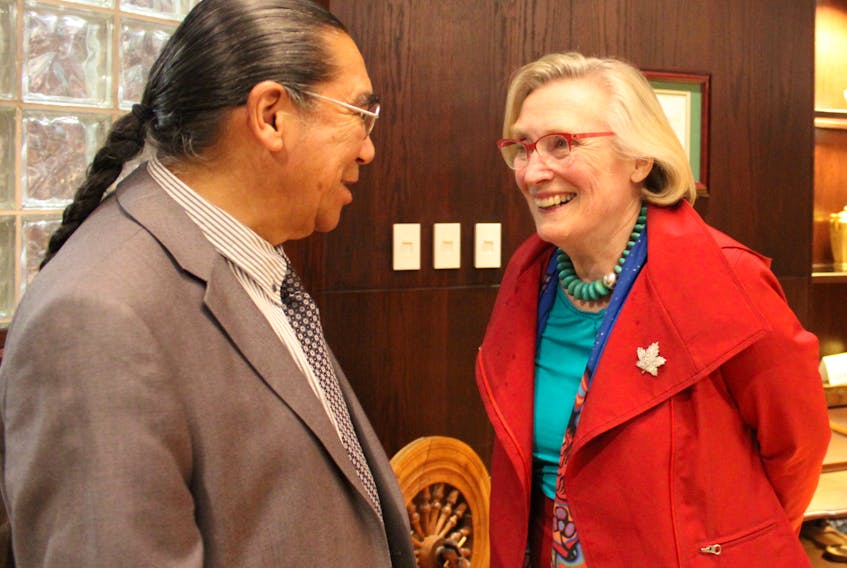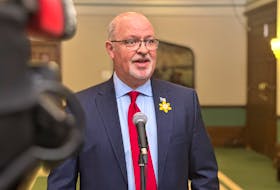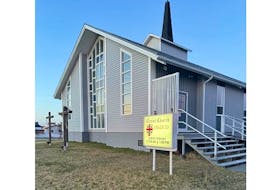OTTAWA — On the eve of the national inquiry into missing and murdered Indigenous women’s release of its final report, Crown-Indigenous Relations Minister Carolyn Bennett says she’s hearing “negative” feedback to recent recommendations from the inquiry’s chief commissioner for harsher sentences for those who commit crimes against Indigenous women.
In an interview with the Post on Thursday, Bennett said she’s spoken to women’s organizations in anticipation of the final report, and they believe the inquiry’s proposals are the wrong approach to curbing violence against Indigenous women, comparing them to mandatory minimum sentences.
Chief Commissioner Marion Buller, however, is standing by her recommendations, insisting that “stiffer penalties” are needed “so that Indigenous women and girls aren’t considered as expendable.”
The disagreement speaks to a complicated question the federal government will likely have to tackle after the report’s release on Monday, more than two and a half years after the inquiry’s launch in September 2016, regarding how best to protect vulnerable Indigenous women and girls. Buller argues the criminal justice system needs to forcibly correct for systemic bias, which often sees lighter sentences applied to people who hurt Indigenous women. To that end, she wants victims who are Indigenous women to be considered an aggravating factor in sentencing, and automatic first-degree murder charges for homicides of Indigenous women. “We really need to … protect Indigenous women and girls from being targeted, because they’re seen to be dispensable or not as valuable or not as important as other complainants,” she said.
Bennett, however, seemed doubtful that a more punitive approach is the way forward, saying that “deterrents are quite often deemed to be ineffective” when it comes to preventing violence. Indigenous men, often the offenders in domestic violence cases involving Indigenous women, are already over-represented in Canadian prisons. “It is about evidence-based practice and what actually works,” she said. “I think that’s the way we always need to take decisions — is this something that actually will work?”
The Liberals will be under pressure to respond to the inquiry’s recommendations in the last months before the fall federal election, as the inquiry was one of Prime Minister Justin Trudeau’s key commitments ahead of his election in 2015. But the Liberals are left with virtually no time to make any legislative changes, as Parliament will rise in June and likely won’t sit again until after the election.
The tight timeline is the result of a six-month extension the government granted the inquiry last year, after the commissioners had asked for two additional years to complete their work. Bennett voiced some disappointment over the delay. “The original intent was the report would be in November (2018), such that we would have had not only a legislative cycle but a budget cycle to be able to deal with the recommendations,” she said.
In a hint of what’s to come in the inquiry’s final report, Buller made her recommendations about stricter sentencing to a Senate committee in May. In response, the committee passed three amendments to the Liberals’ criminal justice legislation, Bill C-75, that could pave the way for harsher sentences for those convicted of domestic violence against Indigenous women. Buller said the amendments are “a good step towards creating more safety for Indigenous women and girls.”
But the government has yet to accept those amendments, and Bennett appears unconvinced. “I convened a group of women’s organizations in anticipation of this report coming to see if they would have ideas as to the kinds of things we should prepare for,” she said. “People have been discussing this approach around … harsher sentences or different charges. I’ve heard a fair bit of negative response to that, in terms of seeing it as mandatory minimums from a different way.”
She wouldn’t commit to implementing all of the report’s recommendations, saying the government will need to consult with Indigenous groups and provincial and territorial governments. “Obviously there may be elements of the report that are more controversial, and we will have to listen,” she said.
On Friday, CBC News reported on a leaked copy of the final report, saying it runs over 1,200 pages and contains more than 230 recommendations. According to CBC, the report concludes that the thousands of murders and disappearances of Indigenous women and girls constitute a “Canadian genocide.” It also includes the recommendation that homicides in cases of domestic violence be treated as first-degree murder.
Buller, who spoke to the Post before the report had leaked, said that Indigenous families and survivors will expect concrete action from the government. “They’re going to have many, many vocal people who will hold their feet to the fire.”
She said she was disappointed by the government’s failure to respond to a recommendation from the national inquiry’s interim report, released in November 2017, that called for a national police task force to review and investigate cold cases. “All the families and survivors are hoping for a more thorough response from all levels of government to the findings and recommendations we make on Monday,” she said.
Bennett said the government has already taken some steps to address violence against Indigenous women and girls, including new Indigenous child welfare legislation currently making its way through Parliament. In February, the government also launched a $10-million commemoration fund for missing and murdered Indigenous women.
Almost from its inception, the national inquiry was plagued with public accusations of poor communication and disorganization, as well as a number of high-profile resignations, including one of its five commissioners.
“I think there’s no question that there were difficulties at the beginning and there was no question in anybody’s mind that this was going to be hard work,” Bennett said. “Now we’ve got to go in and get the next chapter begun … healing for the families, justice for the victims, and the prevention to make sure that we can stop this tragedy.”
Buller said she’s proud that the inquiry has “given voice” to families and survivors across Canada. “It’s the truth, and you can’t unhear it anymore,” she said. “The families and survivors, in sharing their truths with us, have really started to rewrite Canadian history about what it’s really like for Indigenous women and girls and 2SLGBTQQIA people. You can’t undo that anymore.”
• Email: [email protected] | Twitter: MauraForrest
Copyright Postmedia Network Inc., 2019









